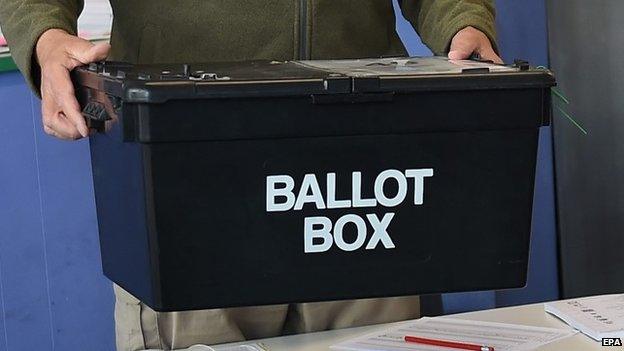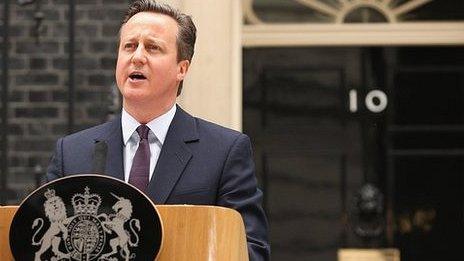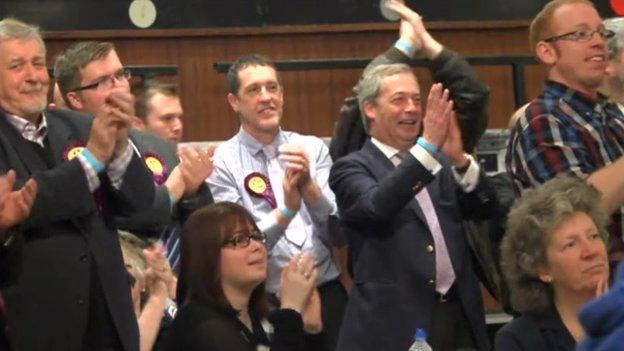Conservatives make gains in English council polls
- Published

The Conservatives remain the largest party in local government in England
The Tories have made gains in local council elections in England, held on the same day as the general election.
They have won an extra 535 seats so far and wrested control of 29 councils across the south and the Midlands.
Labour and the Lib Dems suffered losses but UKIP won control of its first council in Thanet, Kent, where Nigel Farage failed in his bid to become MP.
The Green Party also fared well, winning seven seats in Bristol and overtaking the Liberal Democrats there.
About 9,200 seats were up for grabs in 279 metropolitan, district and unitary authorities across England, excluding London. The last time they were contested was in 2011.
Counting began on Friday, after general election results were declared, and continued on Saturday.
By late evening, the state of play was:
The Conservatives have won 5,364 seats, up 535. They control 159 councils, an increase of 29
Labour have won 2,199 seats, down 180. They control 73 councils, two fewer than before
The Lib Dems have won 619 seats, down 361. They control four councils, four fewer than before
UKIP has won 204 seats, boosting its representation by 85. It controls one council, its first in the UK
The Green Party has won 83 seats, a net gain of 2
A handful of councils still have to declare.
The Conservatives have consolidated their position in the south of England and the Midlands, making gains in areas where they did well in Thursday's general election.
They took control of Amber Valley, North Warwickshire and Gravesham from Labour and Hinckley and Bosworth from the Liberal Democrats.
They now have a majority of seats in councils such as Staffordshire Moorlands, Wyre Forest and Newark and Sherwood where no party previously exercised control.
The Conservatives won seven seats in Telford and Wrekin, in the wake of their surprise victory in the Telford parliamentary seat on Friday. They have also assumed control of Scarborough and Waveney councils.
Battlegrounds
Labour, on the other hand, suffered reverses in the Midlands, losing seven seats in Stoke-on-Trent - which moved from a Labour majority to no overall control - and four in Dudley. However, they are now in the majority in Stockton-on-Tees and West Lancashire, having previously been the largest party.
They also gained Cheshire West from the Conservatives.
The Lib Dems lost more than 300 seats, losing control of South Somerset, Three Rivers and Watford to no overall control - mirroring setbacks in those areas in the general election.
The party also lost six seats on Bristol Council and were leapfrogged by the Green Party into third place.
UKIP deputy chairman Suzanne Evans said she was "beyond delighted" with the party's first win in Thanet District Council.
Nigel Farage resigned as party leader after Conservative Craig Mackinlay beat him to the parliamentary seat of Thanet South.
Elsewhere, UKIP made headway in the north of England. In Rotherham, where the party has campaigned heavily in recent months, it picked up three seats.
It also won seven seats in Thurrock in Essex, where it failed narrowly to win the parliamentary seat.
A series of mayoral contests have also been decided, with former Labour MP Sir Peter Soulsby retaining Leicester, Lib Dem Dave Hodgson winning in Bedford and Labour's David Budd winning in Middlesbrough.
Conservative Gordon Oliver won in Torbay while independents Kate Allsop and Mike Starkie prevailed in Mansfield and Copeland respectively.
- Published8 May 2015

- Published10 May 2015
